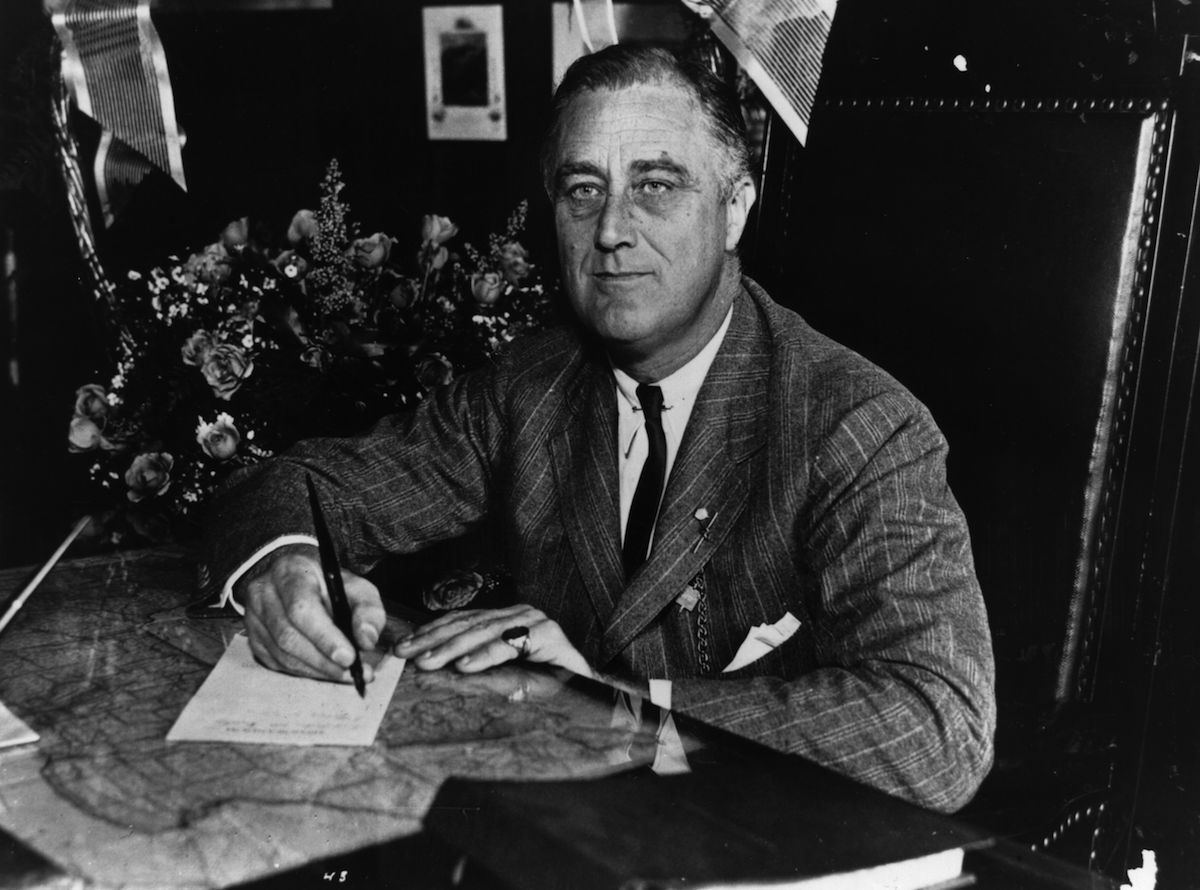
Some of our most revered Presidents, whose faces have adorned coins and currency for over a century, are coming under attack. In several states, Democratic Party organizations have ended the tradition of Jefferson and Jackson day dinners, on the grounds that both these men owned slaves and that Jackson supported the removal of Indian tribes from the South to Oklahoma. In light of Woodrow Wilson’s racist policies, students at Princeton University want his name removed from a graduate school in public policy and a residential center. And a new book, Ethan Michaeli’s The Defender, slams Franklin Roosevelt’s administration for snubbing and threatening a black newspaper, the Chicago Defender, because it openly protested segregation in the armed forces during the Second World War. All of these men, it seems, took positions that would not be accepted in present-day society.
Most of these accusations are true. Jefferson did own slaves, although he hoped slavery would eventually disappear. So did Jackson, and he ignored a Supreme Court decision that ruled the removal of Indian tribes illegal. Wilson was perhaps the most retrograde racist ever to occupy the White House. And the military remained segregated during the Second World War.
Yet there is a paradox in the attacks upon these presidents, most of which are coming from the left side of the political spectrum. While they practiced, endorsed or failed to overthrow various forms of racism, these presidents were all champions of the common man, in the forefront of fights for economic equality, an issue that is one of the American left’s most important causes in the run-up to the 2016 election.
To be sure, Jefferson’s idea of the common man has little resonance in contemporary America. This is not only because of racism, but because he located virtue in small farmers, a very numerous and increasing class in his day, but one that is now threatened with extinction. He opposed Hamilton’s plans for a national bank because he believed it would favor powerful urban economic interests, which he regarded as a danger to liberty. From the beginning of civilized times, he once wrote John Adams, politics had been a single eternal struggle, in which “everyone takes his side in favor of the many, or of the few”—and he stood firmly on the side of the many. The popularity of these ideas enabled the Democratic Party, which he founded, to occupy the White House from 1801 until 1841. During the New Deal era, Franklin Roosevelt not only built the Jefferson Memorial in Washington, but argued repeatedly that he was simply adapting Jefferson’s principles to a new industrial age.
By the time that Andrew Jackson took office in 1829, Jefferson’s political and economic vision had moved much closer to reality. Not only had the settlement of the Midwest proceeded apace, but many states now allowed all adult white males to vote. And Jackson cast himself as the defender not merely of the small farmer, but of the urban artisan and mechanic as well. In 1832, in the midst of his re-election campaign, Jackson, in the pivotal event of his presidency, vetoed a bill to recharter and keep in existence the Second Bank of the United States. “It is to be regretted,” his veto message read, “that the rich and powerful too often bend the acts of government to their selfish purposes.” When laws, he said, undertook “to grant titles, gratuities, and exclusive privileges, to make the rich richer and the potent more powerful, the humble members of society—the farmers, mechanics, and laborers—who have neither the time nor the means of securing like favors to themselves, have a right to complain of the injustice of their Government.” Surely no Bernie Sanders or Elizabeth Warren booster should be ashamed to repeat those words 184 years later? Had not Andrew Jackson, whatever his faults, identified one of the critical issues of a capitalist democracy, and a problem that has become far more serious during the last 40 years?
The New Freedom that Woodrow Wilson called for in 1912 was also an economic one—a freedom from the tyranny of monopolies, or trusts, which had come to dominate economic life over the previous thirty years or so. “The great Government we loved,” he said in his first inaugural, “has too often been made use of for private and selfish purposes, and those who used it had forgotten the people.” In office, he created the Federal Reserve system to oversee and stabilize banking, passed new anti-trust legislation, reduced the protective tariffs that protected the trusts, and modestly increased the rights of labor. That was the platform that led W. E. B. DuBois and the NAACP to support Wilson in that election against Theodore Roosevelt. And although Wilson completely betrayed their hopes by imposing segregation in Washington, DuBois still called upon his fellow black citizens to support Wilson and the war effort in 1917, on the grounds that Wilson and the allies were fighting for justice around the world.
Franklin Roosevelt, who assumed office in 1933 in the midst of the worst economic crisis in American history, was far more committed in both word and deed to the economic well-being of the whole American people than any of his predecessors. Although white Southerners managed to keep some of the benefits of the New Deal away from the black people of the South, exempting agricultural workers from the Social Security system and the protection of labor laws, both the urban and even the rural black population benefited from many New Deal measures along with their white fellow citizens. That is why black voters in the North and border states abandoned their traditional allegiance to the Republicans and voted in large numbers for FDR, beginning in 1936.
Yes, it is true that no reporter from the Defender or other Negro newspapers (as they were then called) could sit in FDR’s press conferences. More importantly, it is quite true that FDR had disappointed the Defender and other Negro papers in several ways, including his failure to push harder for an anti-lynching law and his Administration’s failure to challenge segregation in the armed forces. Yet in an extraordinary editorial in the fall of 1940, when mainstream newspapers overwhelmingly supported Republican Wendell Willkie, the Defender endorsed him. “President Roosevelt,” their editorial read, “has placed himself squarely on the side of the people’s interests, against those of the ‘money changers in the temple.’ No Administration in our history has done more than the New Deal to achieve economic and social democracy. Roosevelt’s defeat would be a victory not only for the dictators of Europe but also for the financial moguls of the U.S.A.”
Today, in 2016, elements of both parties are taking an interest in the problem of economic inequality. While it has not received much systematic attention during the last 40 years, it is anything but a new problem in American history. Literally from the moment of the founding of the Republic, some of our greatest leaders have wrestled with the question of how political democracy can be protected against the power of great wealth. Our political traditions are filled with inspiring words on the topic—words that often ring true even today. But those who favor greater economic and political democracy will renounce a powerful weapon if they insist upon treating men like Jefferson, Jackson, Wilson and FDR as pariahs, simply because they had not yet arrived at 21st-century ideas about race, gender and sexual preference.

Historians explain how the past informs the present
David Kaiser, a historian, has taught at Harvard, Carnegie Mellon, Williams College, and the Naval War College. He is the author of seven books, including, most recently, No End Save Victory: How FDR Led the Nation into War. He lives in Watertown, Mass.
More Must-Reads From TIME
- The 100 Most Influential People of 2024
- The Revolution of Yulia Navalnaya
- 6 Compliments That Land Every Time
- What's the Deal With the Bitcoin Halving?
- If You're Dating Right Now , You're Brave: Column
- The AI That Could Heal a Divided Internet
- Fallout Is a Brilliant Model for the Future of Video Game Adaptations
- Want Weekly Recs on What to Watch, Read, and More? Sign Up for Worth Your Time
Contact us at letters@time.com